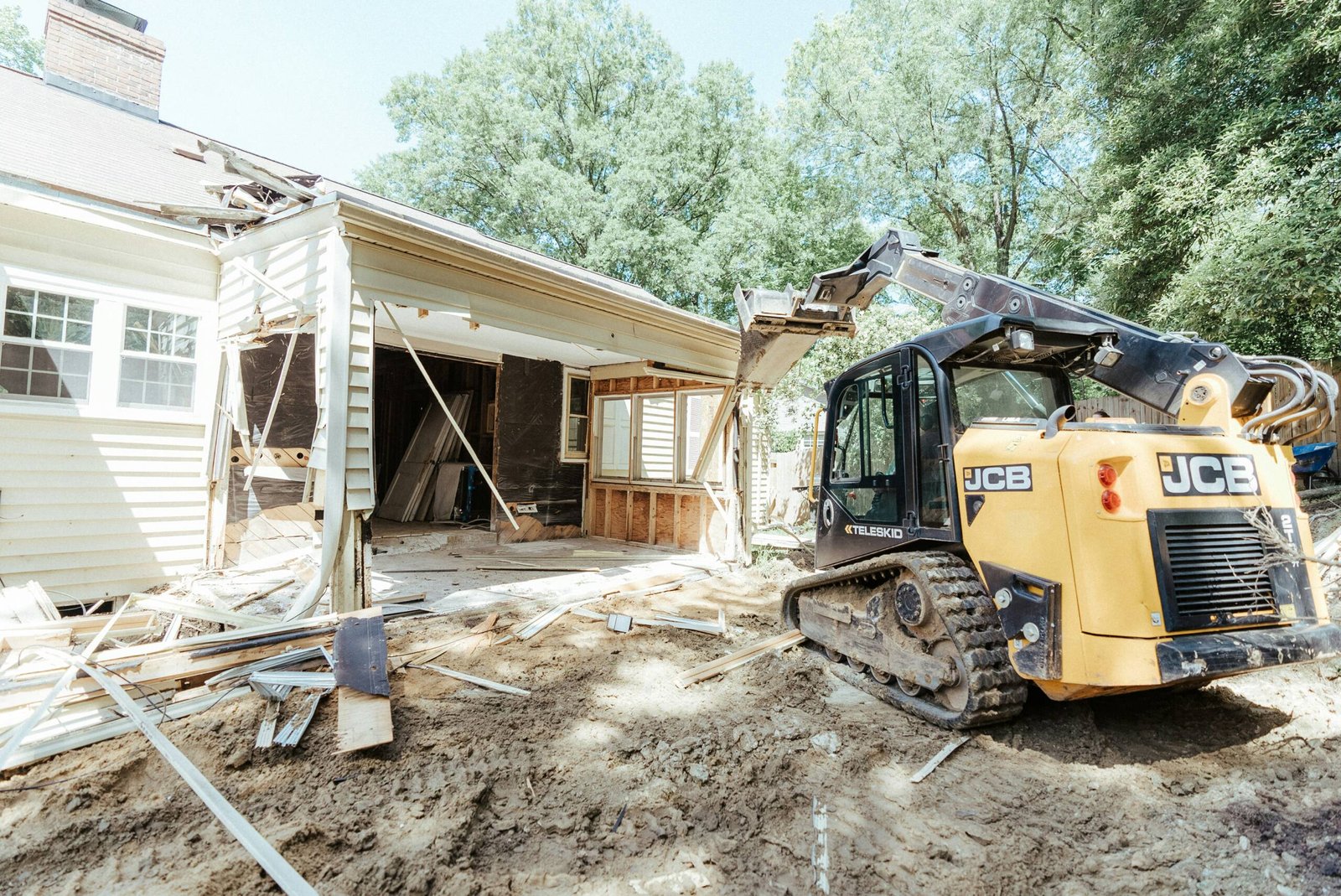
Table of Contents
Understanding the Role of a General Contractor
A general contractor (GC) plays a pivotal role in the construction industry, overseeing the entire execution of a project from conception to completion. This multifaceted position entails a range of responsibilities that ensure a project runs smoothly, on time, and within budget. Primarily, a general contractor manages the day-to-day operations of a construction site, coordinating tasks among various subcontractors, suppliers, and clients. To successfully fulfill this role, a GC must possess a diverse skill set, including project management, communication, and problem-solving abilities.
One of the primary responsibilities of a general contractor is to create and maintain a comprehensive project schedule. This involves ensuring that all subcontractors understand their tasks and deadlines, which is vital for the timely progression of the project. Additionally, the GC is responsible for budgeting, often using estimates and bids to allocate resources effectively. This financial oversight extends to managing payments to subcontractors and suppliers, ensuring that all aspects of the project remain financially viable.
Moreover, a general contractor acts as a liaison between the different stakeholders involved in a construction project. This includes conversing with clients to ascertain their needs and expectations, as well as collaborating with architects and engineers to resolve any design or technical issues that may arise. The relationship between a GC and subcontractors is equally important; maintaining clear communication and fostering a cooperative environment is essential for the success of the project.
The role of a general contractor is critical in ensuring projects adhere to safety regulations and building codes. By prioritizing compliance, a GC not only safeguards the well-being of the workforce but also protects the integrity of the project. In summary, a general contractor is fundamental to the construction process, ensuring that all elements come together efficiently to achieve the desired outcome.
Educational Background and Certifications
To embark on a career as a general contractor, it is essential to understand the educational and certification requirements that can significantly elevate one’s qualifications in the industry. A well-rounded educational background lays the groundwork for a successful career in construction management and project oversight.
Many aspiring general contractors choose to pursue a degree in construction management, civil engineering, or architecture. Such programs provide foundational knowledge in construction principles, project planning, and structural design. Trade schools also offer specialized programs focused on various construction trades, enabling individuals to gain practical skills and knowledge that are directly applicable to the field. These programs often cover essential subjects like carpentry, electrical work, plumbing, and masonry, creating a comprehensive skill set that benefits future contractors.
In addition to formal degrees, apprenticeships play a crucial role in the training of general contractors. Through hands-on experience under the guidance of experienced professionals, apprentices acquire valuable insights into daily operations, safety protocols, and project management. This real-world training complements formal education and equips candidates with practical skills essential for effectively managing construction projects.
Certifications also enhance a candidate’s profile and can be pivotal in standing out in a competitive job market. The Certified General Contractor (CGC) designation is among the most esteemed certifications in this field, signifying a contractor’s commitment to best practices and regulatory compliance. Furthermore, obtaining other relevant licenses, such as a general contractor’s license or a specialty trade license, not only bolsters credibility but also demonstrates an understanding of local laws and regulations governing construction projects.
Ultimately, a robust educational background, combined with relevant certifications and practical experience, can equip aspiring general contractors with the skills and knowledge needed for successful career advancement in the construction industry.
Gaining Relevant Experience
Gaining practical experience is crucial for aspiring general contractors as it lays the foundation for a successful career in the construction industry. Engaging in various job roles or internships can provide invaluable insight into the daily operations of construction projects and the responsibilities of a general contractor.
One common entry point for individuals looking to enter this field is through positions such as construction laborers, site assistants, or carpenters. These roles introduce entry-level workers to the industry’s nuances and allow them to familiarize themselves with construction tools, safety protocols, and team dynamics. By starting in these positions, individuals can gradually build their skill sets, which are essential for managing construction projects effectively.
Another effective way to gain experience is through internships offered by established construction firms. Many companies provide structured internship programs that expose participants to real-world projects. These opportunities often allow interns to shadow experienced general contractors, participate in project planning meetings, and even take on small tasks under supervision. Such exposure is beneficial for understanding the intricate details involved in project management and the importance of meeting project deadlines and budgets.
To transition from entry-level positions to a general contractor role successfully, it is imperative to demonstrate a proactive approach to learning and professional development. Aspiring contractors should seek mentorship from seasoned professionals and consider pursuing relevant certifications, such as those offered by trade organizations. Participating in workshops or taking additional coursework in construction management or contract administration also contributes to a deeper understanding of the field.
Incorporating this hands-on experience, along with a commitment to continual learning, can significantly enhance one’s qualifications for a general contractor position, ultimately leading to more opportunities for advancement within the industry.
Preparing Your Resume for a General Contractor Role
Creating a compelling resume tailored for a general contractor position is essential for standing out in a competitive job market. A well-structured resume should highlight your relevant work experience, specific skills, and certifications that showcase your qualifications for the role. Begin with a strong summary statement that outlines your career achievements and emphasizes your suitability for a general contractor role.
When detailing your work experience, focus on positions that are directly related to construction management or similar fields. Include a brief description of your responsibilities, emphasizing any leadership roles you assumed during your tenure. Use action verbs to describe your accomplishments, such as “managed,” “coordinated,” or “oversaw,” to convey your proactive approach and ability to lead teams effectively. Quantify your achievements wherever possible, such as noting the completion of projects on time and within budget, as this information can significantly enhance your credibility.
In addition to showcasing work experience, it is crucial to list specific skills relevant to the general contractor position. Highlight proficiencies in areas such as project management, budgeting, and scheduling, as well as technical skills like knowledge of building codes or experience with construction software. Soft skills, such as communication and problem-solving, are also vital in this industry and should be included to present a well-rounded picture of your capabilities.
Certifications are another critical aspect of your resume. Include any relevant licenses, such as a General Contractor License, as well as additional certifications in safety and project management, which can set you apart from other candidates. Finally, pay attention to the format of your resume; ensure it is clear, concise, and visually appealing. A well-organized layout will aid in readability and make a lasting impression on potential employers.
Crafting a Winning Cover Letter
When applying for a general contractor position, a well-crafted cover letter can distinguish you from other candidates. This critical document should serve as a bridge between your resume and the hiring manager, articulating your qualifications and enthusiasm for the role. To create an impactful cover letter, begin by personalizing it to the specific job and company. Address the letter to the hiring manager by name whenever possible, and reference the job listing directly to demonstrate your keen interest.
Your opening paragraph should establish a connection to the general contractor role, briefly introducing yourself while highlighting any mutual ties or shared interests with the organization. Following the introduction, delve into your relevant experience and skills that align with the job description. For instance, if you have overseen a large construction project or managed subcontractors efficiently, detail these accomplishments to illustrate your capabilities in the field. Be specific and quantitative; mention metrics such as the budget you managed or how you completed a project ahead of schedule.
In addition to outlining your professional history, it is crucial to convey your genuine enthusiasm for the position. Employers are looking for candidates who not only possess the requisite skills but are also passionate about their work. Share a brief anecdote about why you pursued a career as a general contractor or discuss your commitment to quality and safety in the construction industry. This personal touch can help potential employers see you as a fitting addition to their team.
Lastly, close your letter with a strong statement about your eagerness to contribute to their projects. Thank the hiring manager for considering your application and suggest your interest in discussing how your experience can benefit their organization. A polished and persuasive cover letter will undoubtedly enhance your candidacy in the competitive field of general contracting.


Networking in the Construction Industry
Networking plays a crucial role in establishing a successful career as a general contractor. Building professional relationships can open doors to job opportunities and provide pathways for career advancement in the competitive construction sector. By connecting with industry professionals, aspiring general contractors can access valuable insights, advice, and support.
One effective strategy for networking is to engage with local trade organizations. Many regions have associations dedicated to construction professionals where individuals can meet others in the same field. These organizations often host regular meetings, training sessions, and social events that provide excellent opportunities to connect with experienced general contractors and other related professionals. Joining these organizations not only allows individuals to network but also helps to stay updated on the latest trends and technologies in the construction industry.
Attending industry events such as trade shows, seminars, and conferences is another excellent means of expanding one’s professional network. These gatherings attract a broad spectrum of industry stakeholders, including project managers, architects, and suppliers. By participating in discussions, asking questions, and sharing experiences, one can foster relationships with peers and establish a positive reputation within the field. It is essential to approach such events with a clear objective and an open mind to maximize the benefits of networking.
Moreover, leveraging social media platforms such as LinkedIn can significantly enhance a general contractor’s networking efforts. By creating a professional profile and actively engaging with relevant content, individuals can easily connect with other professionals and potential employers. Participating in discussions, sharing knowledge, and joining professional groups will create visibility and foster relationships that can lead to job opportunities or referrals in the future.
In summary, effective networking can greatly assist in the journey to becoming a successful general contractor. By actively engaging in organizations, attending industry events, and utilizing social media, individuals can build a strong professional network that leads to greater career prospects and opportunities for growth in the construction industry.
Interview Preparation Strategies
Preparing for an interview as a general contractor requires a multifaceted approach that highlights both technical competencies and soft skills pertinent to the construction industry. Start by familiarizing yourself with common interview questions that may be posed, such as inquiries about your experience managing projects, coordinating with subcontractors, or handling unexpected challenges on-site. It is advisable to practice answering these questions confidently and concisely, as demonstrating knowledge and experience will help convey your suitability for the role.
In addition to preparing for specific questions, it is crucial to conduct thorough research on the potential employer. Understand their core values, previous projects, and overall reputation in the industry. Websites, social media platforms, and construction industry publications can provide valuable insights into the company’s operations and portfolio. This knowledge not only equips you with information to ask informed questions during the interview but also showcases your enthusiasm and interest in the position. Being aware of their methodologies or any innovative practices will give you an edge in discussing how your approach aligns with the company’s goals.
Another effective strategy is to compile a list of your qualifications and relevant experiences. Highlight your project management skills and technical knowledge, as these are crucial for a general contractor role. Be prepared to discuss specific projects you have led, detailing your contributions and how they benefited the overall outcome. Using quantifiable successes, such as completing a project ahead of schedule or under budget, can significantly enhance your presentation. Conveying your capability to manage teams and foster collaboration will further emphasize your eligibility for the position you are applying for.
In conclusion, thorough preparation for your interview as a general contractor can significantly impact your chances of success. By anticipating questions, researching the company, and demonstrating relevant skills, you will present yourself as a well-rounded candidate for the role.
Understanding the Licensing Process
Obtaining a license as a general contractor is a crucial step for individuals seeking to operate legally and effectively in the construction industry. The licensing requirements vary significantly across different states and regions, reflecting local regulations and standards. Initially, prospective general contractors must research the specific requirements applicable to their jurisdiction, as each may dictate unique qualifications, application procedures, and fees.
In most cases, applicants are required to demonstrate a certain level of experience in the construction field. This often entails documenting previous work history, providing references, and possibly passing an examination that assesses knowledge of construction, safety regulations, and local building codes. In addition to experience, some states may require completion of specific educational programs or workshops related to construction management.
Application fees can vary widely, depending on the state and the type of license sought, generally ranging from a few hundred to several thousand dollars. It is important for candidates to budget accordingly and be aware of any additional fees that might be incurred during the licensing process, such as background checks or testing fees. To streamline the application, potential general contractors should gather all requisite documentation in advance, including proof of liability insurance and workers’ compensation coverage.
Moreover, compliance with local building codes and regulations is paramount for all general contractors. Having a thorough understanding of the legal framework governing construction projects in the desired location can mitigate risks and ensure successful project execution. Prospective contractors may also find it beneficial to engage with local trade associations or professional organizations to stay updated on changes in licensing standards and industry best practices.
Proper preparation and adherence to the licensing process not only provide legitimacy to a general contracting business but also build a strong foundation for reputable practice within the construction industry.
Continuing Education and Professional Development
In the ever-evolving landscape of the construction industry, it is crucial for general contractors to prioritize ongoing education and professional development. Acquiring a position as a general contractor is just the beginning of a journey that necessitates continuous learning. As construction methodologies, materials, safety standards, and regulations change, contractors must engage in educational programs that keep them informed and skilled.
Advanced certifications offer an excellent opportunity for general contractors to enhance their credentials and demonstrate their commitment to professional excellence. Certifications from recognized organizations not only expand a contractor’s technical knowledge but also improve their marketability. For instance, pursuing certifications in project management, safety training, or sustainable building practices can significantly elevate a contractor’s expertise and appeal to potential clients. These advanced qualifications often lead to better job opportunities and potentially higher earnings.
Moreover, workshops and industry seminars provide practical, hands-on learning experiences. These events often feature expert speakers who share valuable insights on emerging trends, innovative technologies, and regulatory changes impacting the construction field. Participating in such gatherings fosters networking opportunities, allowing contractors to connect with peers and industry leaders, thus broadening their professional horizons.
Another vital aspect of continuing education is the utilization of online resources. Many organizations offer courses that can be completed at one’s own pace, making it easier for busy general contractors to pursue additional knowledge without disrupting their existing commitments. Staying engaged in professional development through various avenues ensures that general contractors remain competitive in a demanding marketplace.
Investing in ongoing education is essential for general contractors aiming to achieve long-term success in their careers. A commitment to continual learning not only enhances personal skills but also ultimately leads to improved project outcomes, satisfied clients, and a stronger professional reputation.


